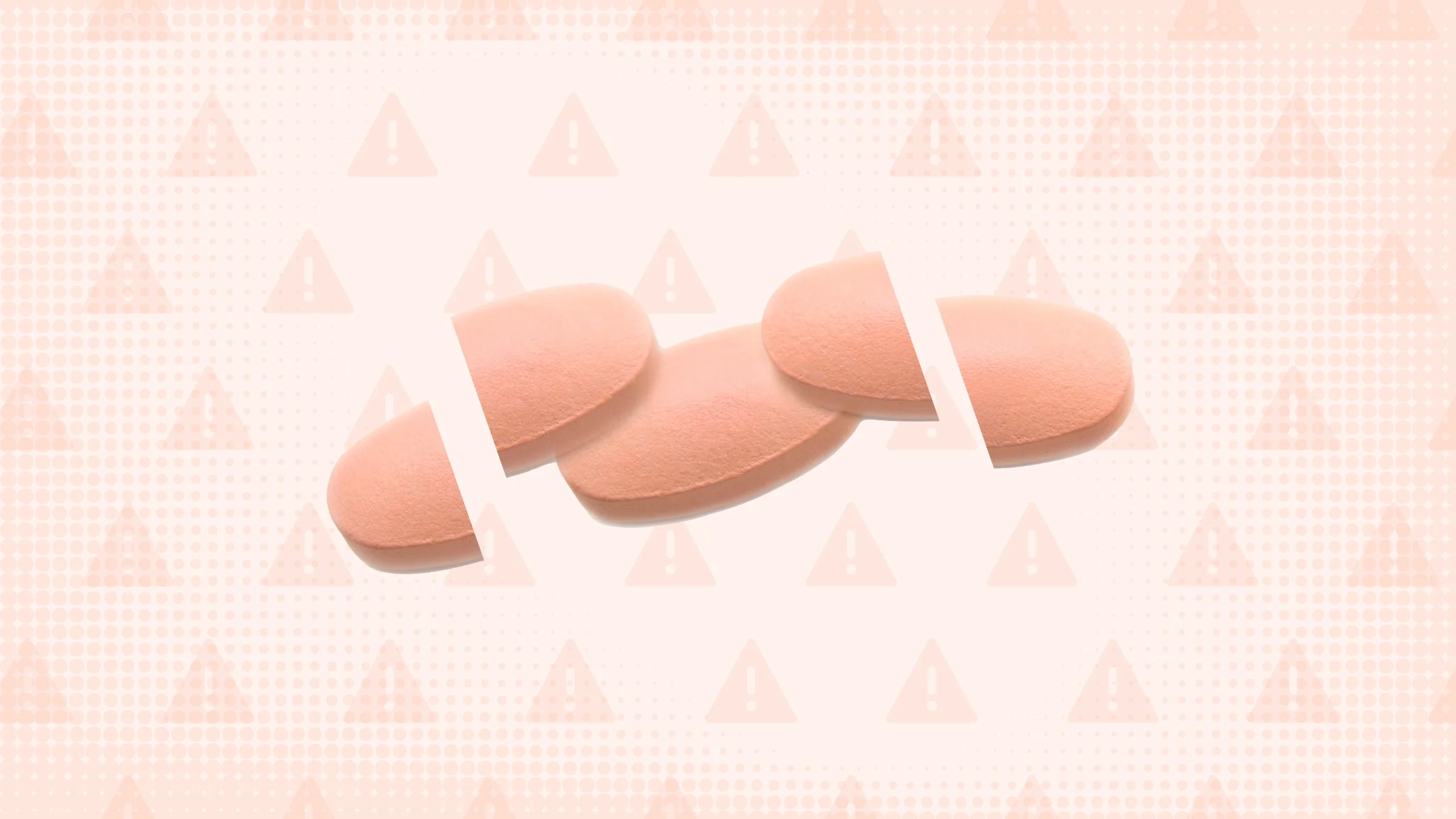Key takeaways:
Fluvoxamine (Luvox) is a selective serotonin reuptake inhibitor (SSRI) that treats obsessive-compulsive disorder. Common fluvoxamine side effects include nausea, sleep changes, and anxiety. Dry mouth and increased sweating are also possible.
Fluvoxamine can cause sexual side effects for both men and women taking it. In some cases, these issues improve over time, but not always. Your prescriber can recommend additional or alternative treatments to manage sexual side effects if they occur.
Rare but serious fluvoxamine side effects include an increased risk of bleeding and serotonin syndrome. The risk is higher if you take fluvoxamine with other medications that also carry these risks.
Save on related medications
Fluvoxamine (Luvox) is a selective serotonin reuptake inhibitor (SSRI) antidepressant medication. But unlike other SSRIs, it’s only approved to treat obsessive-compulsive disorder (OCD). Knowing what side effects you may experience while taking fluvoxamine can help you get the most from your medication.
Fluvoxamine side effects at a glance
Below is a list of common and rare fluvoxamine side effects reported in clinical studies. Keep in mind that other side effects are possible while taking this medication. So it’s best to talk to your healthcare team about any side effects that occur, even if they’re not listed here.
Common fluvoxamine side effects include:
Nausea and vomiting
Drowsiness
Trouble sleeping
Headache
Feeling weak
Nervousness
Agitation
Dizziness
Sexual issues
Sweating
Loss of appetite
Dry mouth
Taste changes
Gas
Rare but serious fluvoxamine side effects include:
Serotonin syndrome
Increased bleeding risk
Increased seizure risk
Severely low sodium levels
This medication also has a boxed warning about an increased risk of suicidal thoughts and behavior in children and adolescents. This is the FDA’s most serious warning for medications.
Let’s take a look at eight fluvoxamine side effects in greater detail. We’ll outline what to look out for, how to manage them, and when to seek medical care.
1. Nausea
Nausea is one of the most common side effects of fluvoxamine. It was reported by 40% of adults in clinical studies. Nausea will often improve over time as your body gets used to the medication. But it may worsen temporarily if your prescriber increases your dose during treatment.
To ease nausea:
Take fluvoxamine with food or just before bed.
Stay hydrated by sipping water throughout the day.
Eat small, frequent meals.
Avoid heavy, greasy, or spicy foods.
If nausea persists or is severe, let your prescriber know. They may be able to break your dose up into smaller doses throughout the day to help reduce this side effect.
2. Sleep changes
Some people experience sleep changes when taking fluvoxamine. You might find that you’re having more trouble sleeping at night (insomnia). Fluvoxamine can also make you feel sleepy or physically weak throughout the day — especially if you’re not sleeping well. Like nausea, these side effects may improve with time.
If you’re having trouble sleeping, try practicing good sleep hygiene. Go to bed at the same time every day, avoid screens before bed, and keep your bedroom dark, cool, and quiet. You can also talk to your prescriber about the timing of your fluvoxamine dose(s). They may be able to make adjustments to reduce insomnia.
How SSRIs compare: Fluvoxamine belongs to a medication class known as selective serotonin reuptake inhibitors (SSRIs). See how SSRIs like fluvoxamine, fluoxetine, and escitalopram compare.
First-hand accounts: Read how four people living with obsessive-compulsive disorder manage their symptoms.
Fluvoxamine dosages: Learn about the recommended fluvoxamine dosages and what to do if you miss a dose.
To combat excess sleepiness and boost your energy during the day, try getting some exercise first thing in the morning. Going outside and getting some sunlight can also help stimulate your natural wake cycle. It’s fine to take a brief nap during the day if needed. But if you’re unable to stay awake or sleepiness is interfering with your normal routine, let your prescriber know.
3. Anxiety
Fluvoxamine and other SSRIs may increase feelings of anxiety for some people. You may feel more nervous or agitated than usual.
Regular exercise and healthy stress-relief strategies, such as mindfulness and deep breathing exercises, can help you feel calmer and more centered. Connecting with loved ones or speaking with a mental health professional can also help.
As your brain gets used to fluvoxamine, this initial anxiety may go away on its own. But if your anxiety isn’t improving or gets worse over the first month or so of treatment, let your prescriber know.
4. Sexual side effects
Sexual side effects in both men and women can happen while taking fluvoxamine. This includes abnormal ejaculation and erectile dysfunction, reduced sex drive, and difficulty reaching orgasm.
Sexual side effects can persist for the course of fluvoxamine treatment. It’s still a good idea to give your body time to adjust to the medication to see if they improve. But if sexual side effects are affecting your quality of life, don’t hesitate to talk to your prescriber about them. They may want to change your medication or add on another treatment to help improve your symptoms.
5. Dry mouth
Dry mouth and taste changes are less common fluvoxamine side effects. But they can be bothersome if they occur.
There are a few things you can try to improve dry mouth. Chewing sugarless gum or sucking on sugar-free lozenges may help encourage saliva flow. Staying well hydrated can also help. There are also over-the-counter (OTC) saliva substitutes, such as Biotene, that can help you feel more comfortable. Improving dry mouth may also help with taste changes.
You should also get regular dental cleanings and checkups. Dry mouth can make you more susceptible to cavities.
If your dry mouth becomes bothersome or is leading to dental issues, let your prescriber know. A different treatment option may be a better fit for you.
6. Increased sweating
Many antidepressants, including fluvoxamine, can cause increased sweating. To help manage this side effect, try using a stronger antiperspirant, such as Drysol (aluminum chloride hexahydrate), and wearing loose-fitting, absorbent clothing.
If these measures don’t help and sweating doesn’t improve with time, let your prescriber know. Adjusting your dosage or switching medications might help.
7. Increased bleeding risk
SSRIs, including fluvoxamine, can increase your risk of bleeding. This side effect isn’t common. But taking fluvoxamine with other medications that also increase your bleeding risk increases the chances. This includes nonsteroidal anti-inflammatory drugs (NSAIDs), such as ibuprofen (Motrin, Advil). It also includes warfarin (Coumadin, Jantoven) and other prescription blood thinners.
Let your prescriber know if you’re bruising more easily than usual or your gums are bleeding when you brush your teeth. Seek emergency care if signs of serious bleeding appear, such as coughing up or vomiting blood or a bruise that continues to get bigger.
8. Serotonin syndrome
Serotonin syndrome is a rare but serious fluvoxamine side effect. It happens when you have too much serotonin in your body. Serotonin syndrome can happen with fluvoxamine alone. But the risk is higher if you also take other medications that increase serotonin levels. These include:
Triptan migraine medications, such as sumatriptan (Imitrex)
Certain antinausea medications, such as ondansetron (Zofran)
Dietary supplements, such as St. John’s wort and tryptophan
Make sure your prescriber knows if you’re taking any of the above medications before starting fluvoxamine. And don’t add any of these medications to your regimen without checking with your healthcare team first.
Symptoms of serotonin syndrome can mimic other fluvoxamine side effects, such as sweating and feeling anxious. But other side effects are also possible, such as confusion, fever, and muscle spasms. If you notice any of these side effects, it’s best to seek medical care. Serotonin syndrome can be dangerous if it’s left untreated.
The bottom line
Fluvoxamine (Luvox) is a selective serotonin reuptake inhibitor (SSRI) approved for treating obsessive-compulsive disorder (OCD). Common fluvoxamine side effects include nausea, sleep changes, and anxiety. Dry mouth and increased sweating are also possible. These side effects often improve as your body adjusts to the medication.
Sexual side effects can also occur in both men and women while taking fluvoxamine. These issues may resolve over time, but your prescriber can recommend strategies or alternative treatments if they persist.
Rare but serious fluvoxamine side effects, such as an increased risk of bleeding and serotonin syndrome, are more likely if fluvoxamine is combined with other medications that share these risks. To minimize the chance of these side effects, it's important to review your medication list with your healthcare team before starting fluvoxamine.

Why trust our experts?



References
Bryant Ranch Prepack. (2024). Fluvoxamine maleate- fluvoxamine maleate tablet, coated [package insert].
Harada, T., et al. (2014). A prospective naturalistic study of antidepressant-induced jitteriness/anxiety syndrome. Neuropsychiatric Disease and Treatment.
National Alliance on Mental Illness. (2024). Fluvoxamine (Luvox).
Oral Health Foundation. (n.d.). Dry mouth.
Rahman, A. A., et al. (2024). Concomitant use of selective serotonin reuptake inhibitors with oral anticoagulants and risk of major bleeding. JAMA Network Open.

















